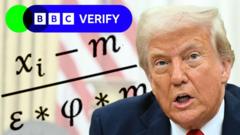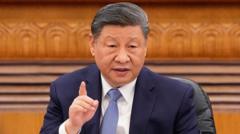In a bold move framed as a response to national emergency, President Trump has announced extensive tariffs affecting multiple nations, except Canada and Mexico, aiming to bolster domestic production and provoke European countermeasures.**
Trump Declares Economic Independence with Unprecedented Tariffs on Imports**

Trump Declares Economic Independence with Unprecedented Tariffs on Imports**
President Trump introduces sweeping tariffs targeting global trading partners, sparking immediate market reactions and responses from Europe.**
In a notable event in the White House Rose Garden, President Donald Trump announced unprecedented tariffs on imports, including a baseline charge of 10 percent on all trading partners, excluding Canada and Mexico. Some tariffs extend even beyond 30 percent for select countries. This announcement was positioned by Trump as a critical step towards achieving economic independence for the United States, describing the day as a “liberation day.”
Market reaction was swift and severe, with Wall Street demonstrating considerable unease over the potential impacts of the tariffs on the economy. The stock market shows signs of decline, compounded by a weak dollar as analysts scramble to decipher the logistics behind the tariff structure, leading to confusion over the numbers announced.
In response, European officials are preparing countermeasures. Historically, the EU has responded to tariff increases by placing higher tariffs on a diverse array of goods. Discussions have emerged regarding retaliatory penalties, including potential tariffs on U.S. technology firms and restricting American banks’ access to European markets.
As the global trading landscape shifts dramatically, many are closely monitoring how the U.S. and EU will navigate this escalating trade tension.





















